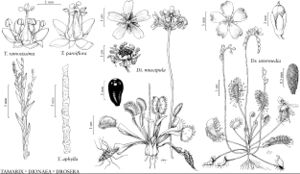Shrubs or trees [subshrubs], usually halophytes, rheophytes, or xerophytes. Leaves alternate, scalelike [subulate], small; stipules absent. Inflorescences simple or compound racemes usually equal or more in number to petals, distinct [connate basally or fasciculate], often attached to fleshy nectar disc; pistil (2–)3–4(–5)-carpellate; ovary 1-locular, sometimes almost plurilocular, ovules 2+ per placenta, anatropous, bitegmic; placentation parietal, basal, or parietal-basal; styles [2–]3–4[–5] [absent, stigmas sessile]. Fruits capsular, dehiscence loculicidal. Seeds comose at one end [hairy overall]; embryo straight; endosperm absent [scanty, starchy]; thin perisperm often present.
Distribution
Europe, Asia, Africa, especially from Mediterranean to c Asia.
Discussion
Genera 4, species ca. 78 (1 genus, 8 species in the flora).
Tamaricaceae have traditionally been placed in the Violales, but recent analyses of molecular sequence data place the family within the Caryophyllales of the core eudicots. Frankeniaceae has retained its place as sister family to Tamaricaceae, sharing similarities in many characters, including secondary chemistry and salt gland structure.
Selected References
Crins, W. J. 1989. The Tamaricaceae of the southeastern United States. J. Arnold Arbor. 70: 403–425.
